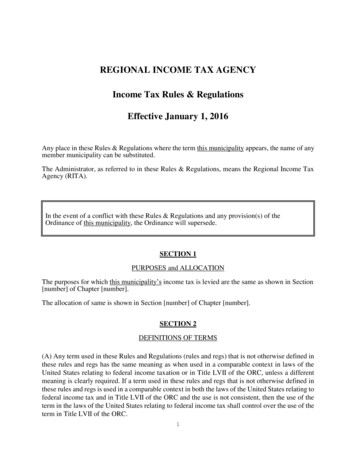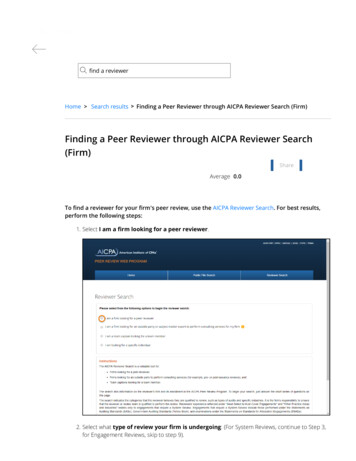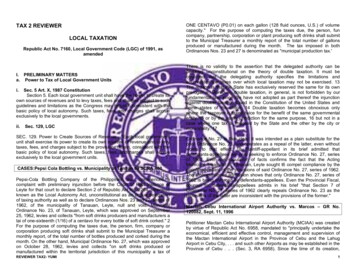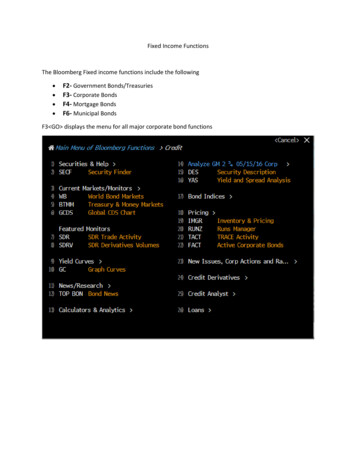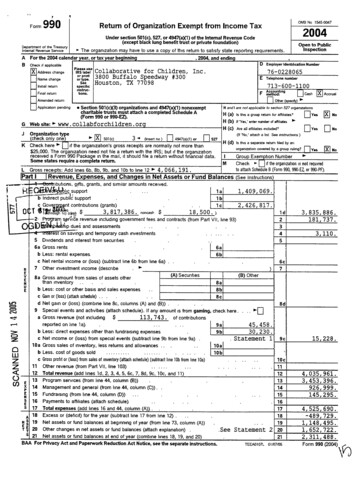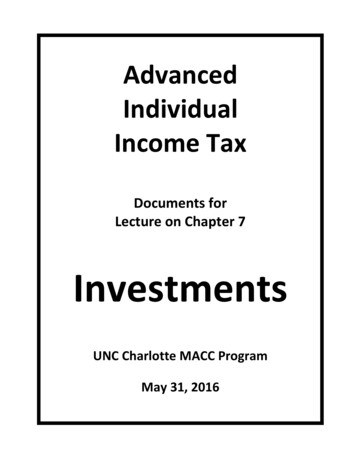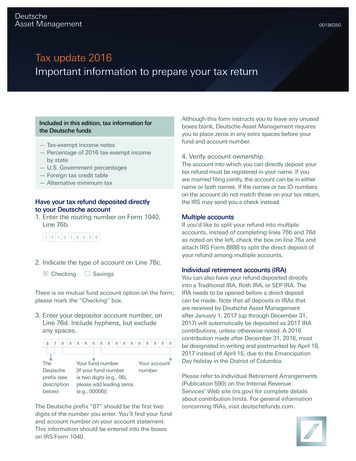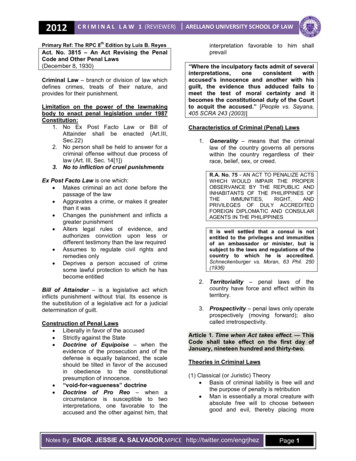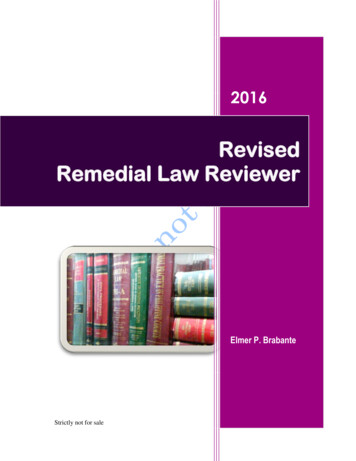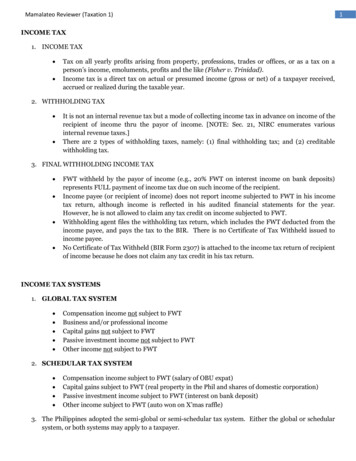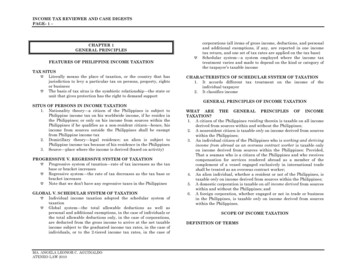
Transcription
INCOME TAX REVIEWER AND CASE DIGESTSPAGE- 1 –CHAPTER 1GENERAL PRINCIPLESFEATURES OF PHILIPPINE INCOME TAXATIONTAX SITUS Literally means the place of taxation, or the country that hasjurisdiction to levy a particular tax on persons, property, rightsor business The basis of tax situs is the symbiotic relationship—the state orunit that gives protection has the right to demand supportSITUS OF PERSONS IN INCOME TAXATION1. Nationality theory—a citizen of the Philippines is subject toPhilippine income tax on his worldwide income, if he resides inthe Philippines; or only on his income from sources within thePhilippines if he qualifies as a non-resident citizen—hence, hisincome from sources outside the Philippines shall be exemptfrom Philippine income tax2. Domicillary theory—legal residence; an alien is subject toPhilippine income tax because of his residence in the Philippines3. Source—place where the income is derived (based on activity)PROGRESSIVE V. REGRESSIVE SYSTEM OF TAXATION Progressive system of taxation—rate of tax increases as the taxbase or bracket increases Regressive system—the rate of tax decreases as the tax base orbracket increases Note that we don’t have any regressive taxes in the PhilippinesGLOBAL V. SCHEDULAR SYSTEM OF TAXATION Individual income taxation adopted the schedular system oftaxation Global system—the total allowable deductions as well aspersonal and additional exemptions, in the case of individuals orthe total allowable deductions only, in the case of corporations,are deducted from the gross income to arrive at the net taxableincome subject to the graduated income tax rates, in the case ofindividuals, or to the 2-tiered income tax rates, in the case ofMA. ANGELA LEONOR C. AGUINALDOATENEO LAW 2010 corporations (all items of gross income, deductions, and personaland additional exemptions, if any, are reported in one incometax return, and one set of tax rates are applied on the tax base)Schedular system—a system employed where the income taxtreatment varies and made to depend on the kind or category ofthe taxpayer’s taxable incomeCHARACTERISTICS OF SCHEDULAR SYSTEM OF TAXATION1. It accords different tax treatment on the income of theindividual taxpayer2. It classifies incomeGENERAL PRINCIPLES OF INCOME TAXATIONWHAT ARE THE GENERAL PRINCIPLES OF INCOMETAXATION?1. A citizen of the Philippines residing therein is taxable on all incomederived from sources within and without the Philippines;2. A nonresident citizen is taxable only on income derived from sourceswithin the Philippines;3. An individual citizen of the Philippines who is working and derivingincome from abroad as an overseas contract worker is taxable onlyon income derived from sources within the Philippines: Provided,That a seaman who is a citizen of the Philippines and who receivescompensation for services rendered abroad as a member of thecomplement of a vessel engaged exclusively in international tradeshall be treated as an overseas contract worker;4. An alien individual, whether a resident or not of the Philippines, istaxable only on income derived from sources within the Philippines;5. A domestic corporation is taxable on all income derived from sourceswithin and without the Philippines; and6. A foreign corporation, whether engaged or not in trade or businessin the Philippines, is taxable only on income derived from sourceswithin the Philippines.SCOPE OF INCOME TAXATIONDEFINITION OF TERMS
INCOME TAX REVIEWER AND CASE DIGESTSPAGE- 2 –PERSONS It means an individual, a trust, estate or corporation.CORPORATION It shall include partnerships, no matter how created ororganized, joint-stock companies, joint accounts (cuentas enparticipacion), association, or insurance companies, but does notinclude general professional partnerships and a joint venture orconsortium formed for the purpose of undertaking constructionprojects or engaging in petroleum, coal, geothermal and otherenergy operations pursuant to an operating consortiumagreement under a service contract with the Government."General professional partnerships" are partnerships formed bypersons for the sole purpose of exercising their commonprofession, no part of the income of which is derived fromengaging in any trade or business.5.likewise be treated as a nonresident citizen for the taxable yearin which he arrives in the Philippines with respect to his incomederived from sources abroad until the date of his arrival in thePhilippines.The taxpayer shall submit proof to the Commissioner to showhis intention of leaving the Philippines to reside permanentlyabroad or to return to and reside in the Philippines as the casemay be for purpose of this Section.RESIDENT ALIEN It means an individual whose residence is within the Philippinesand who is not a citizen thereof.NON-RESIDENT ALIEN It means an individual whose residence is not within thePhilippines and who is not a citizen thereof.DOMESTIC The term "domestic", when applied to a corporation, meanscreated or organized in the Philippines or under its laws.RESIDENT FOREIGN CORPORATION The term applies to a foreign corporation engaged in trade orbusiness within the Philippines.FOREIGN The term "foreign", when applied to a corporation, means acorporation which is not domestic.NON-RESIDENT FOREIGN CORPORATION The term applies to a foreign corporation not engaged in trade orbusiness within the Philippines.NONRESIDENT CITIZEN1. A citizen of the Philippines who establishes to the satisfaction ofthe Commissioner the fact of his physical presence abroad witha definite intention to reside therein.2. A citizen of the Philippines who leaves the Philippines duringthe taxable year to reside abroad, either as an immigrant or foremployment on a permanent basis.3. A citizen of the Philippines who works and derives income fromabroad and whose employment thereat requires him to bephysically present abroad most of the time during the taxableyear.4. A citizen who has been previously considered as nonresidentcitizen and who arrives in the Philippines at any time duringthe taxable year to reside permanently in the Philippines shallFIDUCIARY The term means a guardian, trustee, executor, administrator,receiver, conservator or any person acting in any fiduciarycapacity for any person.MA. ANGELA LEONOR C. AGUINALDOATENEO LAW 2010WITHHOLDING AGENT The term means any person required to deduct and withholdany tax under the provisions of Section 57.SHARES OF STOCK The term shall include shares of stock of a corporation, warrantsand/or options to purchase shares of stock, as well as units ofparticipation in a partnership (except general professionalpartnerships), joint stock companies, joint accounts, joint
INCOME TAX REVIEWER AND CASE DIGESTSPAGE- 3 –ventures taxable as corporations, associations and recreation oramusement clubs (such as golf, polo or similar clubs), andmutual fund certificates.SHAREHOLDER The term shall include holders of a share/s of stock, warrant/sand/or option/s to purchase shares of stock of a corporation, aswell as a holder of a unit of participation in a partnership(except general professional partnerships) in a joint stockcompany, a joint account, a taxable joint venture, a member ofan association, recreation or amusement club (such as golf, poloor similar clubs) and a holder of a mutual fund certificate, amember in an association, joint-stock company, or insurancecompany.TAXPAYER The term means any person subject to tax imposed by this Title.INCLUDING OR INCLUDES The terms when used in a definition contained in this Title,shall not be deemed to exclude other things otherwise within themeaning of the term defined. The terms shall be construed according to the method ofaccounting upon the basis of which the net income is computedunder this Title.TRADE OR BUSINESS The term includes the performance of the functions of a publicoffice.SECURITIES The term means shares of stock in a corporation and rights tosubscribe for or to receive such shares. The term includes bonds,debentures, notes or certificates, or other evidence orindebtedness, issued by any corporation, including those issuedby a government or political subdivision thereof, with interestcoupons or in registered form.DEALER IN SECURITIES The term means a merchant of stocks or securities, whether anindividual, partnership or corporation, with an established placeof business, regularly engaged in the purchase of securities andthe resale thereof to customers; that is, one who, as a merchant,buys securities and re-sells them to customers with a view to thegains and profits that may be derived therefrom.TAXABLE YEAR The term means the calendar year, or the fiscal year endingduring such calendar year, upon the basis of which the netincome is computed under this Title. 'Taxable year' includes, inthe case of a return made for a fractional part of a year underthe provisions of this Title or under rules and regulationsprescribed by the Secretary of Finance, upon recommendation ofthe commissioner, the period for which such return is made.BANK The term means every banking institution, as defined in Section2 of Republic Act No. 337, as amended, otherwise known as theGeneral banking Act. A bank may either be a commercial bank,a thrift bank, a development bank, a rural bank or specializedgovernment bank.FISCAL YEAR The term means an accounting period of twelve (12) monthsending on the last day of any month other than December.NON-BANK FINANCIAL INTERMEDIARY The term means a financial intermediary, as defined in Section2(D)(C) of Republic Act No. 337, as amended, otherwise knownas the General Banking Act, authorized by the Bangko Sentralng Pilipinas (BSP) to perform quasi-banking activities.PAID OR INCURRED/PAID OR ACCRUEDQUASI-BANKING ACTIVITIESMA. ANGELA LEONOR C. AGUINALDOATENEO LAW 2010
INCOME TAX REVIEWER AND CASE DIGESTSPAGE- 4 – The term means borrowing funds from twenty (20) or morepersonal or corporate lenders at any one time, through theissuance, endorsement, or acceptance of debt instruments of anykind other than deposits for the borrower's own account, orthrough the issuance of certificates of assignment or similarinstruments, with recourse, or of repurchase agreements forpurposes of relending or purchasing receivables and othersimilar obligations: Provided, however, That commercial,industrial and other non-financial companies, which borrowfunds through any of these means for the limited purpose offinancing their own needs or the needs of their agents or dealers,shall not be considered as performing quasi-banking functions.DEPOSIT SUBSTITUTES The term shall mean an alternative from of obtaining fundsfrom the public (the term 'public' means borrowing from twenty(20) or more individual or corporate lenders at any one time)other than deposits, through the issuance, endorsement, oracceptance of debt instruments for the borrowers own account,for the purpose of relending or purchasing of receivables andother obligations, or financing their own needs or the needs oftheir agent or dealer. These instruments may include, but neednot be limited to bankers' acceptances, promissory aseagreements entered into by and between the Bangko Sentral ngPilipinas (BSP) and any authorized agent bank, certificates ofassignment or participation and similar instruments withrecourse: Provided, however, That debt instruments issued forinterbank call loans with maturity of not more than five (5) daysto cover deficiency in reserves against deposit liabilities,including those between or among banks and quasi-banks, shallnot be considered as deposit substitute debt instruments.ORDINARY INCOME The term includes any gain from the sale or exchange ofproperty which is not a capital asset or property described inSection 39(A)(1). Any gain from the sale or exchange of propertywhich is treated or considered, under other provisions of thisTitle, as 'ordinary income' shall be treated as gain from the saleMA. ANGELA LEONOR C. AGUINALDOATENEO LAW 2010or exchange of property which is not a capital asset as defined inSection 39(A)(1). The term 'ordinary loss' includes any loss fromthe sale or exchange of property which is not a capital asset. Anyloss from the sale or exchange of property which is treated orconsidered, under other provisions of this Title, as 'ordinary loss'shall be treated as loss from the sale or exchange of propertywhich is not a capital asset.RANK AND FILE EMPLOYEES The term shall mean all employees who are holding neithermanagerial nor supervisory position as defined under existingprovisions of the Labor Code of the Philippines, as amended.MUTUAL FUND COMPANY The term shall mean an open-end and close-end investmentcompany as defined under the Investment Company Act.TRADE, BUSINESS OR PROFESSION The term shall not include performance of services by thetaxpayer as an employee.REGIONAL OR AREA HEADQUARTERS The term shall mean a branch established in the Philippines bymultinational companies and which headquarters do not earn orderive income from the Philippines and which act assupervisory, communications and coordinating center for theiraffiliates, subsidiaries, or branches in the Asia-Pacific Regionand other foreign markets.REGIONAL OPERATING HEADQUARTERS The term shall mean a branch established in the Philippines bymultinational companies which are engaged in any of thefollowing services: general administration and planning;business planning and coordination; sourcing and procurementof raw materials and components; corporate finance advisoryservices; marketing control and sales promotion; training andpersonnel management; logistic services; research anddevelopment services and product development; technical
INCOME TAX REVIEWER AND CASE DIGESTSPAGE- 5 –support and maintenance; data processing and communications;and business development.LONG-TERM DEPOSIT OR INVESTMENT CERTIFICATES The term shall refer to certificate of time deposit or in
INCOME TAX REVIEWER AND CASE DIGESTS PAGE- 1 – MA. ANGELA LEONOR C. AGUINALDO ATENEO LAW 2010 CHAPTER 1 GENERAL PRINCIPLES FEATURES OF PHILIPPINE INCOME TAXATION TAX SITUS Literally means the place of taxation, or the country that has jurisdiction to levy a particular tax on persons, property, rights or business
